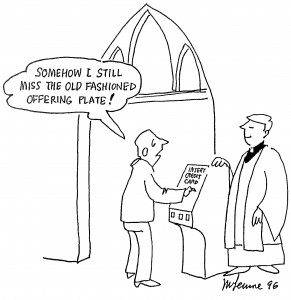Women’s Tea
All women of the church who wish to participate in the planning of the Women’s Tea on February 8th, are invited to stay for a meeting THIS COMING SUNDAY following Coffee & Conversation (at about 11:45am). Remember: this is a fund raiser which will benefit women in developing countries by providing micro-loans through Episcopal Relief and Development.
Tickets: $20 for parishioners; $10 for guests.
Thoughts from Lori
As I write this today, January 6th, it is Epiphany; the Day of Epiphany. Around the Christian world, this is the feast honoring the visitation of the Magi, also known as the Wise Men or the Three Kings. If you remember from my sermon last Sunday, we really don’t know all that much about them. Scripture doesn’t actually say how many there were, nor does it refer to them as kings; not in the New Testament anyway.
We have traditionally assumed that there were three because of the three gifts that were presented to the Holy Family. And we get the idea that they were kings from a reference in Psalm 72. (Check it out.) It’s highly unlikely that they arrived the night of Jesus’ birth. It may have even been a year or two later, which is consistent with Herod’s command to kill all male children under the age of two.
Nonetheless, their arrival is of great importance. They represent the vast world beyond Bethlehem, beyond Judea, beyond whatever limits we might impose on the significance of Jesus. He has, in fact, come for all people! This, however, should not be taken literally as a dismissal of all other religions, of all other faiths. But rather as an inclusion, as the beginning of all things and all people eventually coming together under the banner of peace.
The problem with most religions, ours included, is that we tend to make God too small. It’s the limits of our finite minds, I suppose. But that’s putting a good spin on it, given that it’s more likely about our reluctance to see and acknowledge the vastness, the inclusiveness, and the mercy of God. That’s what these three mysterious travelers symbolize.
As we enter now the season of Epiphany, beginning this Sunday with the observance of the Baptism of Jesus, we will hear readings from scripture about his ministry. It will be a time for us to contemplate the meaning of his coming: the amazing incarnation of God in Christ Jesus! Thanks be to God.
Faithfully,
Lori +
Flu Season is Here!
This is likely to be one of those years when the flu season is particularly threatening. For the next six to eight weeks, I am asking that we take precautions to protect ourselves and each other.
Let’s temporarily curtain our exuberant Passing of the Peace. Instead of hugging – or even shaking hands – let’s bump elbows or simply speak the words of Christ’s Peace to each other. Yes, the elbow thing feels silly, but if it keeps us all safer, it will be worth it, and it’s only for a while.
There will be safe, alcohol-based hand sanitizer in each pew. Use it as frequently as you like, but especially before coming forward for Communion.
Even though it sounds counter-intuitive, please refrain from receiving Communion by Intinction. (That’s when you dip the edge of the wafer in the wine.) The silver of the chalice and the fortified wine we use reduces the spread of bacteria and viruses, and fewer are spread by sipping from the chalice than by hands hovering over the wine.
If you prefer, you may receive only the bread and be assured that you have received the sacrament. Or, if you would like me to dip the wafer for you (mine being only one hand rather than multiple hands), keep the wafer so that I can see it, and I’ll do it for you.
All of these requests are just for the time being; they are not permanent. Your patience and cooperation are much appreciated. Let’s do all we can to STAY WELL!
Coffee & Conversation
We’ll resume “The Thrill of Hope” art series this Sunday and continue it for the next two weeks. Come for the fellowship and interesting discussion.
Annual Parish Meeting
January 25th following morning worship
As is our custom, we will enjoy fellowship and a covered dish luncheon before beginning our business meeting. There is a big sign-up sheet on an easel in the narthex for dishes that you plan to bring. No assignments by alphabet this time. The sign-up is just to help us all see who’s bringing what.
The business meeting is our local version of “the councils of the church,” an ancient phrase that goes all the way back to Jerusalem and the early church.
This is your opportunity to take part in such a council! We will elect new vestry members and wardens, hear (or in most cases, read) reports about the state of the parish.
Even so, the business meeting only takes about an hour. Please make plans to attend.
Flower Chart for 2015
Please contribute to the beauty of our worship by dedicating the altar flowers. The suggested donation is $35, and your dedication may be “in memorial for…” or “in thanksgiving for…” There is a calendar of Sundays on the bulletin board in the narthex where you can sign up. Your dedication will be listed in the Sunday service bulletin on the appropriate date. Thank you so much for adding to our worship in this way.
On the Calendar
Finance Meeting – Tuesday, Jan. 13th, 7:00 p.m. Vestry – Thursday, Jan. 15th, 7:00 p.m. Annual Parish Meeting – Sunday, Jan. 25th Women’s Wednesday – Feb. 4th, 7:00 p.m. Men’s Breakfast – Saturday, Feb. 7th, 8:00 a.m. Women’s Tea – Sunday, Feb. 8th, 4:00 p.m.Lessons and Hymns for Sunday, January 11th
(First Sunday after Epiphany – Year B)
by the Rev. William McLemore
THE SCRIPTURE LESSONS:
The First Reading: Genesis 1:1-5. The opening of the Bible and the Book of Genesis, where God creates the light.
The Psalm: Psalm 29. Here the psalm recounts the marvelous acts of God in creation.
For the Epistle: Acts 19:1-7. Paul baptizes some of the followers of Jesus who had, as of yet, not been baptized.
The Gospel: Mark 1:4-11. The recounting of John the Baptizer performing the rite of water with Jesus which ends with a voice from heaven, “You are my Son, the Beloved, with you I am well pleased.”
THE HYMNS:
Processional Hymn: No. 381. “Thy Strong Word.” This hymn was written by Martin H. Franzman (1907-1976), a graduate of Northwestern College and later studied at Wisconsin Lutheran Seminary. He served on the faculty of Northwestern College; Concordia Seminary in St. Louis, Missouri; and finally traveled to England where he served as a tutor at Westfield House, the theological college of the Evangelical Lutheran Church of England until his death in 1976. The tune, “Ton-y-Botel,” was composed by Thomas John Williams (1869-1944), organist and choirmaster of two parishes in Llanelly, a village in southeast Wales. The melody is moving and stately and perhaps one of the most sung at the heavenly banquet-every Christian should be able to sing this with spirit and joy.
Sequence Hymn: No. 295. “Sing Praise to Our Creator.” This three verse baptism hymn is new to the 1982 Hymnal and the author is listed as Mark Evans, born in 1916, and his hymn copyrighted in 1962. I was unable to find anything further on Mark Evans, however. The tune “Christus,” is an old hymn melody attributed to Mechoir Vulpius (1560? – 1616). The last verse sums up the import of baptism: “And praise the Holy Spirit poured forth upon the earth, who sanctifies and guides us, made strong in our rebirth.”
Presentation Hymn: No. 529. “In Christ There is No East or West.” This hymn was written by a traveling businessman named William Arthur Dunkerley. He began writing novels and songs as a diversion with the penname, John Oxenham. This particular hymn reflects his deep theology from visiting countries all over the world embracing a God whose Son Jesus Christ brings together East and West, and North and South. The tune, “McKee,” was adapted from an Afro-American spiritual by Harry T. Burleigh, a choir member of St. George’s, New York City, and is named in honor of his Rector, Elmore McNeill McKee.
Communion Hymn:No. 312. “Strengthen for Service, Lord.” The beautiful hymn comes from the Coptic Christians of the 4th century and is attributed to St. Ephraim the Syrian. The translation was made by Charles William Humphries (1840-1921). The words implore us to move from receiving the Holy Gifts of the Eucharist to a life of service and witness to God. “The bodies by thy Body fed with thy new life replenish.” The tune, “Malabar” was composed in 1941 by David McKinley Williams (1887-1978) for this text’s first appearance in the Episcopal Hymnal. It is best sung with reverent deliberation.
Recessional Hymn: No. 135. “Songs of Thankfulness.” Christopher Wordsworth, Bishop of London and nephew of the poet, William Wordsworth, wrote this hymn for the sixth Sunday I after the Epiphany. The fourth verse was written and added by Francis Bland Tucker an Episcopal priest who authored and translated many hymns and helped develop the 1940 hymnal. The tune, “Salzburg,” was composed by Jakob Hintze and later harmonized by Johann Sebastian Bach.
January 11th Servants
Usher: Bill Lang Lector: Jill Harrison Intercessor: Terry Jaworski Eucharistic Ministers: Charlie Boak, Deb Lang Vestry Person of the Day: Pam Dietmeyer101 Reasons to be an Episcopalian
Reason 31
“The Book of Common Prayer allows a degree of uniformity in prayer while leaving room for the diversity of cultures, languages and liturgical styles.”
The Very Rev. David G. Bollinger
Diocese of Central New York
From the cartoons created by the Rev. William P. McLemore
1965 – 2014


